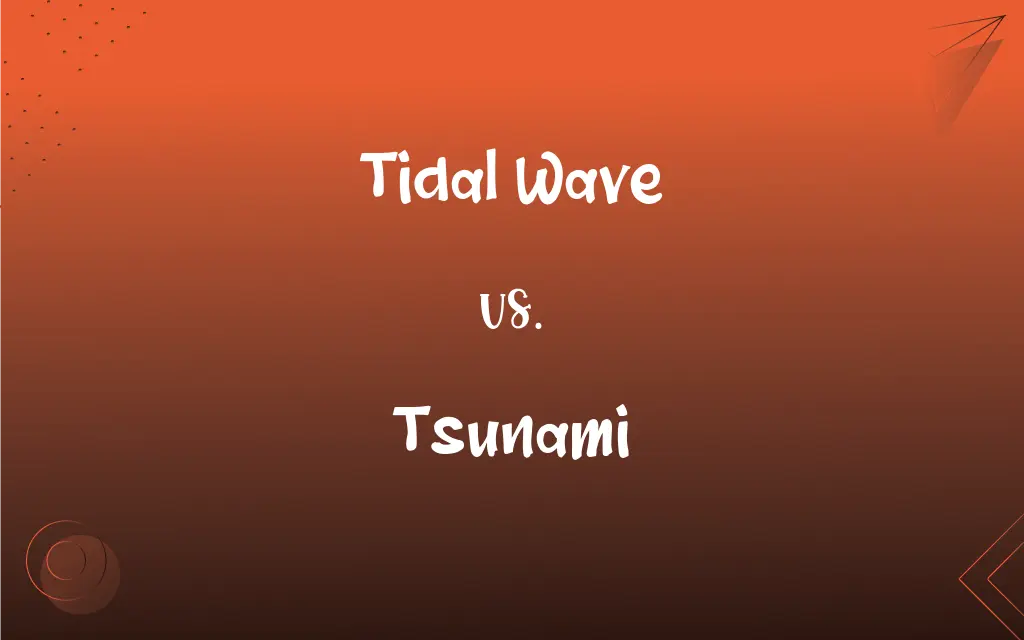Tidal Wave vs. Tsunami: What's the Difference?
Edited by Harlon Moss || By Janet White || Published on November 30, 2023
Tidal waves are large, often destructive sea waves caused by tides or winds, while tsunamis are massive sea waves triggered by underwater seismic activity.

Key Differences
A tidal wave is a term traditionally used to describe a large and powerful ocean wave, often caused by strong winds or atmospheric changes. A tsunami, however, is specifically a wave caused by seismic events like earthquakes, volcanic eruptions, or landslides under the ocean.
Tidal waves are often mistakenly associated with tides but are more accurately wind-generated waves. Tsunamis, in contrast, are not related to weather conditions but are a result of sudden displacements in the ocean floor.
While tidal waves can be large and damaging, they are generally less destructive than tsunamis. Tsunamis, due to their origin, can result in much higher waves and longer wavelengths, leading to far more significant impact when they reach coastlines.
The term "tidal wave" is somewhat misleading and less used in scientific contexts, where "tsunami" is preferred for accuracy. Tsunamis are a specific subset of ocean waves with unique characteristics, including their energy source and wave behavior.
Tidal waves can occur in any large body of water influenced by strong winds, whereas tsunamis are most common in the Pacific Ocean's "Ring of Fire" due to frequent seismic activity in this area.
ADVERTISEMENT
Comparison Chart
Cause
Winds, atmospheric changes
Seismic activities (earthquakes, volcanic eruptions)
Relation to Weather
Often related to weather
Not weather-related
Wave Size
Generally smaller than tsunamis
Potentially very large and long-wavelength
Destructive Potential
Variable, often less than tsunamis
Extremely high, can cause widespread devastation
Scientific Usage
Less preferred, can be misleading
Preferred term for accuracy
ADVERTISEMENT
Tidal Wave and Tsunami Definitions
Tidal Wave
A large ocean wave caused by strong winds or atmospheric changes.
The coastal village prepared for the approaching tidal wave.
Tsunami
A natural disaster phenomenon often occurring in the Pacific's Ring of Fire.
The Ring of Fire is notorious for generating destructive tsunamis.
Tidal Wave
A term often used to describe unusually high and powerful sea waves.
The sailors braced themselves for the tidal wave caused by the storm.
Tsunami
A wave that can travel across entire ocean basins.
The 2004 Indian Ocean tsunami traveled vast distances, affecting multiple countries.
Tidal Wave
A powerful surge of water often resulting from storms.
The tidal wave flooded the lower areas of the town.
Tsunami
A series of ocean waves caused by large-scale seismic disturbances.
The earthquake triggered a tsunami that devastated coastal communities.
Tidal Wave
A wave phenomenon associated with tides but usually related to wind.
The tidal wave surged over the breakwater during the hurricane.
Tsunami
A long-wavelength, high-energy wave generated by underwater events.
The tsunami's immense power was unleashed as it reached shallow waters.
Tidal Wave
An oceanic disturbance sometimes mistaken for tsunami.
News reports initially mislabeled the tsunami as a tidal wave.
Tsunami
A seismic sea wave capable of causing major destruction.
Early warning systems helped mitigate the tsunami's impact.
Tsunami
A very large ocean wave caused by an underwater earthquake or volcanic eruption.
Tsunami
A very large and destructive wave, generally caused by a tremendous disturbance in the ocean, such as an undersea earthquake or volcanic eruption. Tsunami are usually a series of waves, or wave train.
Tsunami
(figurative) A large and generally unstoppable surge.
Tsunami
A huge destructive wave (especially one caused by an earthquake)
FAQs
What causes a tsunami?
Underwater seismic activities like earthquakes or volcanic eruptions.
How are tsunamis detected?
Through seismic monitoring and ocean buoys.
Is a tidal wave the same as a tsunami?
No, they have different causes and characteristics.
Are tidal waves predictable?
They are less predictable due to their dependence on weather.
Can a tidal wave be as destructive as a tsunami?
Generally less destructive, but can still cause significant damage.
How do scientists study tidal waves?
Using meteorological data and oceanographic studies.
Why is 'tidal wave' a misleading term?
It implies a connection with tides, which is often inaccurate.
How fast can a tsunami travel?
Up to 500-800 kilometers per hour in open water.
Can tsunamis be prevented?
Not prevented, but their impact can be mitigated through early warning.
What is a tidal wave?
A large sea wave often caused by wind or atmospheric changes.
Do tidal waves have a season?
No specific season, but more common during stormy periods.
What areas are most at risk for tsunamis?
Coastal regions near seismic fault lines, especially the Pacific Ring of Fire.
Are tidal waves affected by the moon?
Indirectly, as the moon influences tides and atmospheric conditions.
What are the signs of an approaching tsunami?
Rapid sea level change, unusual ocean behavior.
Can a tidal wave be caused by an earthquake?
Not typically; earthquakes primarily cause tsunamis.
How long can a tsunami last?
Several hours, with waves arriving in intervals.
How do tsunami warning systems work?
By detecting seismic activity and changes in ocean levels.
Can tsunamis occur in any ocean?
Yes, but most common in the Pacific and Indian Oceans.
What is the main difference between tidal waves and tsunamis?
Their causes: tidal waves by wind/atmosphere, tsunamis by seismic events.
Do tidal waves occur in lakes?
Rarely, but possible in very large lakes under certain conditions.
About Author
Written by
Janet WhiteJanet White has been an esteemed writer and blogger for Difference Wiki. Holding a Master's degree in Science and Medical Journalism from the prestigious Boston University, she has consistently demonstrated her expertise and passion for her field. When she's not immersed in her work, Janet relishes her time exercising, delving into a good book, and cherishing moments with friends and family.
Edited by
Harlon MossHarlon is a seasoned quality moderator and accomplished content writer for Difference Wiki. An alumnus of the prestigious University of California, he earned his degree in Computer Science. Leveraging his academic background, Harlon brings a meticulous and informed perspective to his work, ensuring content accuracy and excellence.






































































